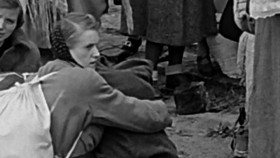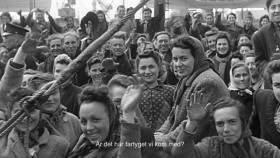


FILMCENTRALEN 2 /Li, Aalbæk Jensen, Zappon
Jeg har ikke set Rued Langgaard (1986) af Anker Li, Peter Aalbæk Jensen og Erik Zappon siden filmen var helt ny. Jeg kan kun huske, at jeg godt kunne lide den. Det var smukt, husker jeg, der var nogle rekonstruktioner, som forbavsede mig, faktisk betog mig dengang. Et gardin som viftede for et vindue åbnet ud til en sommerdag, en togrejse i et gammelt tog. Jeg syntes, det var smukt. Og siden dengang netop har jeg kunnet lide Rued Langgaards musik. Det står fast, jeg kendte den ikke før filmen. Nu ville jeg så se efter, om det holder, om filmen holder.
Som årene er gået har jeg digtet om på erindringen. Allerede i første billede afmonteres den, det blidt i sommervinden duvende gardin er en rustik bræddedør i et badehus i svenske klipper og udsigt fra verandaen udenfor til havet og bølgerne langt nede. Og så er der lyden. Det er sådan denne komponists musik lyder, en til tider voldsom, til tider blid evigt gentaget brusen. Det er en gennemarbejdet, effektiv åbning til en film, hvor der er tænkt over hver detalje i forhold til filmens kerne, som er skildringen af komponistens kamp for det romantiske mod det modene, for en forsvindende indsigt mod en fremvoksende, det kan jeg se nu, at det er. Men jeg kan også se, at årene er gået, at de filmiske ambitioner var andre dengang, forbillederne andre, den kunstnerske sammenhæng en anden. Og derved har filmen fået en ny kvalitet, den dokumenterer sin tid dengang midt i 80’erne. Den er blevet filmhistorie.
Komponisten Bernhard Lewkovitch og konservatorierektoren Tage Nielsen er de første medvirkende af den række musikere, venner og familiemedlemmer, i alt 9, som husker Rued Langgaard og som et oldtidigt kor højtideligt og præcist indkredser hans liv og minde og dermed filmens kerne, dens essays tema. De er så alvorlige og fine. De står der i filmbilledet fraværende (også Lewkovitch, der dog som den den eneste ind imellem ser på mig), fraværende fordi de tænker og er indadvendte, nærværende i mandens besynderlige liv og i hans fremmedartede musik. Erik Zappons kamera træffer de medvirkende i deres stemmes indre tanke, og de taler med blikket fjernt mod en horisont uden for billedet, de taler som til sig selv, genkaldende. Med mig som lyttende. Fotografen og instruktøren og klipperen har forbilledligt løst den vanskelige opgave med anbringelse af medvirkende og deres vidneudsagn i et filmisk forløb. Sådan kan det gøres ved at skrive en filmscene til hver, ved at planlægge lys og setdesign til mindste detalje og gennemføre en fotografisk holdning og idé konsekvent. Og så overlade dette materiale til en klipper, som kan værdsætte og bygge på filmscenens langsomme egetliv. Det er her i dette snart tre årtier gamle filmværk gjort simpelt hen tilfredsstillende, og det er lykkeligt at kunne gense det.
Også arkivmaterialets egetliv har Pernille Bech Christensen blik for. Der er en del arkivoptagelser og det er et lag for sig i fremstilligen, det er en skildring af tiden, han levede i, komponisten, tiden, der som havet bliver musik. Det er meget omhyggeligt lavet. Først er der optagelser fra det fjantede land, hvor livet leves i søndagsfest som var der ikke krig få timers rejse sydpå. Det skildres ved at undlade tempoændring af optagelserne, så den tids lavere antal billeder i sekundet, 12 eller 16, i 1986 produktionen afspilles med dens 24 billeder i sekundet, og personerne bevæger sig så sjovt gammeldags. Det er ret almindeligt jo, og ret populært. Jeg har aldrig kunne lide det, heller ikke her. Men det er et kort afsnit og jeg forstår jo for så vidt dispositionen. Senere da krigen skildres ved arkivoptagelser er tempoændringen foretaget. De gamle reportageoptagelser afspilles i hastigheden, hvormed de er optaget, for hvert sekund film er et antal enkeltbilleder i en særlig teknik blevet til to ens efter hinanden. Også dette snyder øjet og det opleves som scenens oprindelige hastighed og jeg ser det frygtelige med en alvor, som det filmet med. I Magnus Gertthens Every Face has a Name (2015) er den eller en tilsvarende teknik, jeg ikke kender, benyttet til at gøre visse optagelser af flygtningene på havnen Malmø den dag i 1945 endnu langsommere og klipperen Jesper Osmond har i den film gjort det drømmeagtigt, rigtigt og smukt. Her i Rued Langgaard har Pernille Bech Christensen tilsvarende klippet det op til komponistens orkesterværk Sfærernes Musik og til fortællerens beretning om, at denne undergangsverden var Langgaards tankers indhold at bakse med. Arkivmaterialets scener bliver til regulære filmscener også her drømmende, men med deres egen frygtelige skønhed.
Danmark 1986, 51 min.
Foto: Rued Langgaard i 1918 (Det Kongelige Bibliotek). (Jeg kender ingen stills fra filmen)
RUED LANGGAARD
Et biografisk essay med erindrings og arkivstof og talrige iscenesættelser og rekonstruktioner over organisten og komponisten Rued Langgaards (1893-1952) musik og liv. En aldeles rigtig prioritering, at netop denne film er blevet digitaliseret. Medvirkende: Komponisten Bernhard Lewkowich, konservatorieretoren Tage Nielsen, nevøen Gerhard Tatens, dirigenten John Frandsen, naboen i Arild Nina Ramsay, bekendte i Ribe Thomas Alvad, Laurids Blendstrup og Nina Beyer Pedersen. Manuskript og instruktion: Anker Li, Peter Aalbæk Jensen, Erik Zappon. Fotografi: Erik Zappon. Fortællerstemme: Benny Poulsen. Lyddesign: Per Streit. Klip: Pernille Bech Christensen. Produktion: Fortuna Film for DR. Distribution: Filmcentralen/for alle
Filmcentralen, streaming: filmcentralen.dk/alle/film/rued-langgaard
Om filmen Rued Langgaard: dfi.dk/faktaomfilm/film

